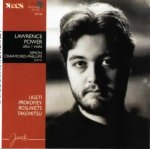British violist Lawrence Power opens this recital disc with the first sonata by Nikolai Roslavets (1926), a performance that more than equals Yuri Bashmet’s 1993 RCA recording. Bashmet’s virtuosity dazzles, especially in the tricky closing section (Molto vivace); Power scores for reasons other than superficial brilliance alone. For example, he produces a wider variety of timbre and sonority than Bashmet and is more faithful to dynamic markings. Ligeti’s solo sonata was composed for Tabea Zimmermann in 1994, and in many ways her own Sony recording is outstanding. Power gives an equally searching and perhaps slightly more analytical performance–not that there’s much to choose between either in purely technical terms. Sony’s engineering is superior, though, having more immediacy and spaciousness beside Harmonia Mundi’s drier-sounding production. In the Takemitsu work, Powers plays with unadorned ease–but the highlight of his collection comes last. The five excerpts from Prokofiev’s Romeo and Juliet in Borisovski’s transcriptions provide an especially thrilling climax for this impressive new release.
































